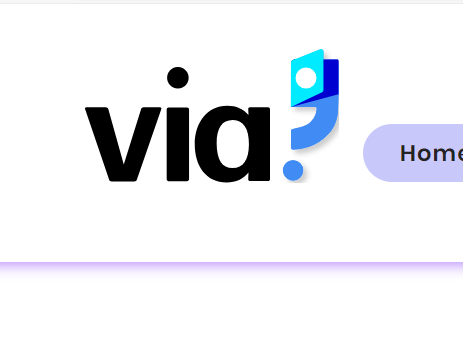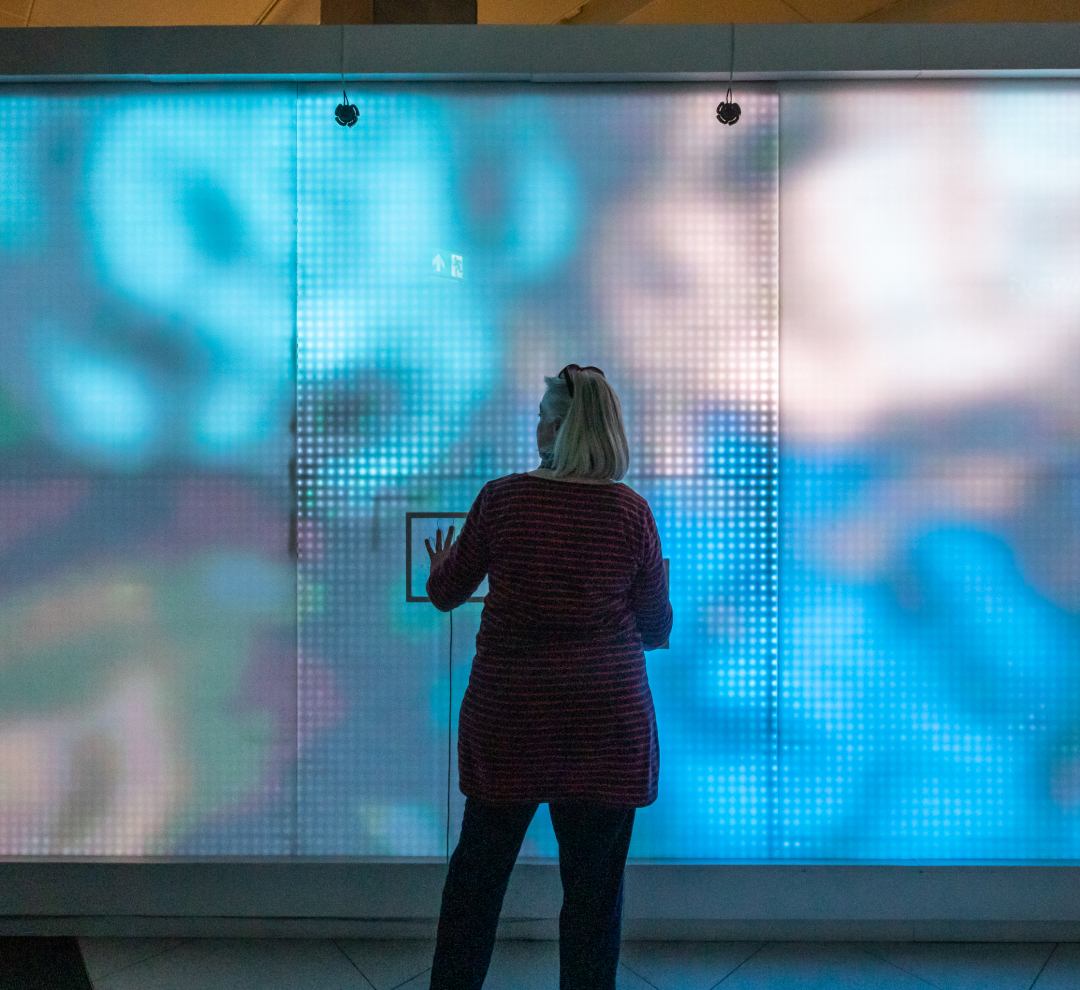“The opportunity and chance to be able to even consider taking this idea forward wouldn’t have been something I thought I was capable of or able to do without the help and support of the programme.” – Stephanie Wilson, VIA
Stephanie Wilson is a freelance artist, designer and consultant, as well as a graphic designer for Passion4Social (P4S) CIC, a creative agency specialising in accessible content and whose social enterprise focus is to create sustainable employment opportunities for people with disabilities.
As a member of the disabled community with lived experience of mental health issues, Stephanie identified an opportunity to support those with diverse access requirements – extending beyond traditional physical access considerations – in comfortably attending venues and events. Stephanie was accepted onto cohort 7 of Creative Bridge to develop a solution for this challenge, and this led to Stephanie applying to become a Connected Innovator to work in a more focused manner on developing VIA (Visible Inclusive Accessibility), a platform and service which would act as a ‘one stop shop’ to provide venues and event organisers with tools to make their spaces and activities more inclusive for a range of audiences, initially in the arts and culture sector.
In the development of VIA, Stephanie carried out significant research into events, from the perspectives of audiences, organisers and venues and tested a range of feature hypotheses to ascertain current accessibility barriers and methods of practice, how to increase accessibility, ease of access and discovery of events, how these can be optimised, stress points and vulnerabilities, an indication of emotions/feelings felt by audiences, etc.
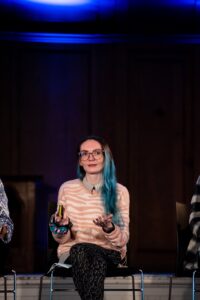
Image: Stephanie Wilson introduces VIA at the Creative
Informatics Innovation Showcase in 2023. Credit: Kat
Gollock/Creative Informatics
This research provided an opportunity to generate a wealth of knowledge through capturing new data points, improving upon the vulnerability, efficiency and effectiveness of current practice, and generating real cultural and social impact by highlighting access needs and valuing lived experiences. These learnings were originally intended to be provided to users through the VIA platform in a range of written and visual documents along with a context report to help provide background information on the research undertaken. However, whilst the timeline for this project was impacted by a number of unfortunate events, including significant illness and the corruption of some key data, which took time to restore, huge achievements were made in bringing together the VIA platform as proposed in Stephanie’s Connected Innovators application, as well as important professional skills being acquired or further developed during the process.
In particular, the experience of being a Connected Innovator and developing VIA provided Stephanie valuable insights on the need to reflect and be mindful of her own barriers and the context in which her project is trying to operate with its mission (for instance the vicious circle which exists of, as a neurodivergent individual, needing to attend venues/events to network in order to make contacts/build relationships/unearth opportunities to make events/venues more accessible, means inevitably encountering the barriers of these environments not currently being accessible, and the emotional, mental and physical strain this places on the individual trying to instigate the change).
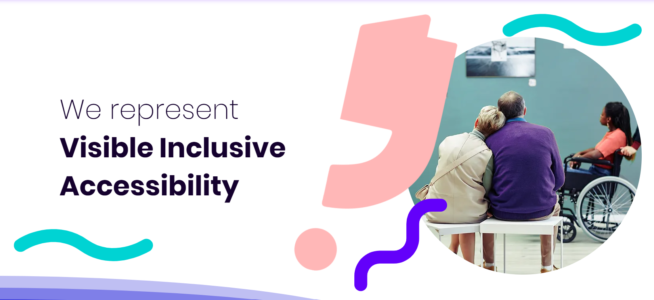
Image: VIA website. Credit: Stephanie Wilson
The report findings particularly highlighted the following challenges and opportunities:
- (64%) of respondents felt that their access needs or the access needs of someone they were accompanying always or often impacted on the ability to access venues/events
- (50%) of the organisers surveyed indicated they were fairly confident, with no respondent indicating that they were very confident.
- The manner in which accessibility information is currently communicated remains a significant barrier for those with access needs, with respondents sharing that the information that is shared often lacks clarity, consistency and adequacy.
- Almost all respondents (92%) have faced difficulties finding information on an event/venue website, of which almost three quarters (72%) of respondents faced difficulties often or all the time.
- Almost two-thirds (64%) of respondents felt that their experience of an event/venue would be improved if it was easier to find accessibility information.
- Two thirds of organisers (67%) feeling that information was time- consuming to collate, two thirds (67%) of organisers feeling it was time-consuming to process, some found it overwhelming (42%).
- Over half (58%) do not have a nominated/specific person whose role/responsibility includes addressing access needs. Most organisers (67%) reported not having a formal policy for considering access needs.
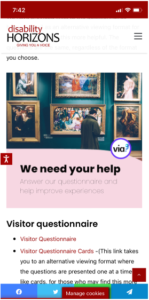
Image: VIA survey. Credit: Disability Horizons/Stephanie Wilson
As a result of this research, Stephanie chose to develop VIA’s services in the following areas to best improve the experiences of visitors and organisers:
Inclusion and Accessibility
Workshops, Training and Development Delivering training and support to remove the biggest barrier disabled people and all in wider society who have access and inclusion needs face – people’s attitudes and perceptions of them and their requirements. These workshops help remove the fear many organisations and individuals face when considering inclusion and accessibility, by sharing best practice and our experiences of inclusion and accessibility, through practical discussion and case studies. Presenting different approaches and frameworks to support the implementation of policies and procedures to help identify and remove barriers.
Bespoke Consultancy Support
To work with and support organisations, employers and service providers on their Inclusion and Accessibility journey, by offering bespoke consultancy to address specific needs and develop a programme of support to break down access barriers faced by disabled people and all in society when accessing goods, services and employment.
Inclusive Recruitment and Supported Employment Projects
Supporting employers to attract and employ a greater percentage of individuals who self-define as disabled under the Equalities Act, contributing to a more diverse and inclusive workforce where the uniquely valuable insights and expertise from individuals with lived experience are utilised to improve services and experiences for all. In turn helping to reduce the Disability Employment Gap in Scotland by supporting greater numbers of disabled people into employment with all the associated benefits this brings.
VIA Platform
Via is currently (time of writing, April 2024), in the process of sourcing funding and support to develop a platform for both visitors and organisers alike to source accessibility information and guidance. The platform will provide audiences with accessibility information to assist them with their visit. Whilst enabling organisers to list their events and access a network of service providers and those with specialist equipment and services to help ease the burden and further support organisers with implementing reasonable adjustments.
Though Stephanie’s initial scope for VIA was focused on events and venues in the arts and culture sector, she has begun to branch her work into other areas. These unanticipated activities have included confirmed paid consultancy training, scheduled for delivery with a large Scottish Government Agency in 2024, and further work with universities to develop bespoke digital inclusion training. In addition, Stephanie has been approached by the University of Edinburgh to consider joint partnerships for future funding and tendering opportunities, and VIA is also delivering part 1 of their training workshops to the Travel and Hospitality sector, Scots Legal and Edinburgh Retail Partnership in the first quarter of 2024, which will bring additional income to the company.
The swift demand for VIA and Stephanie’s specialist skills in other sectors and organisations is proof of demand for accessibility support for event organisers who are not experts in this area but recognise its importance to their community and audience. It is expected that the company will be registered as a social enterprise in 2024, and that further opportunities to share the important knowledge which Stephanie has gathered, as well as generate income, will continue to develop.
